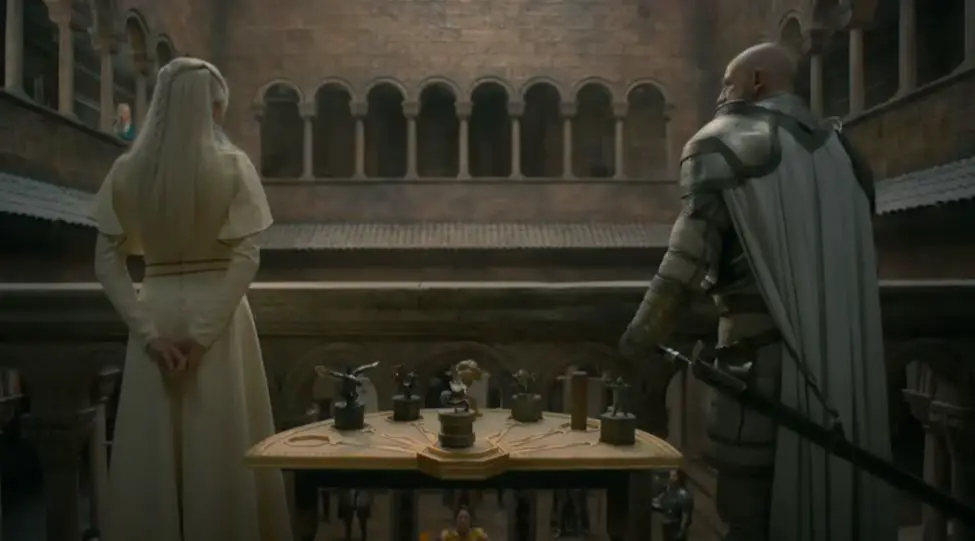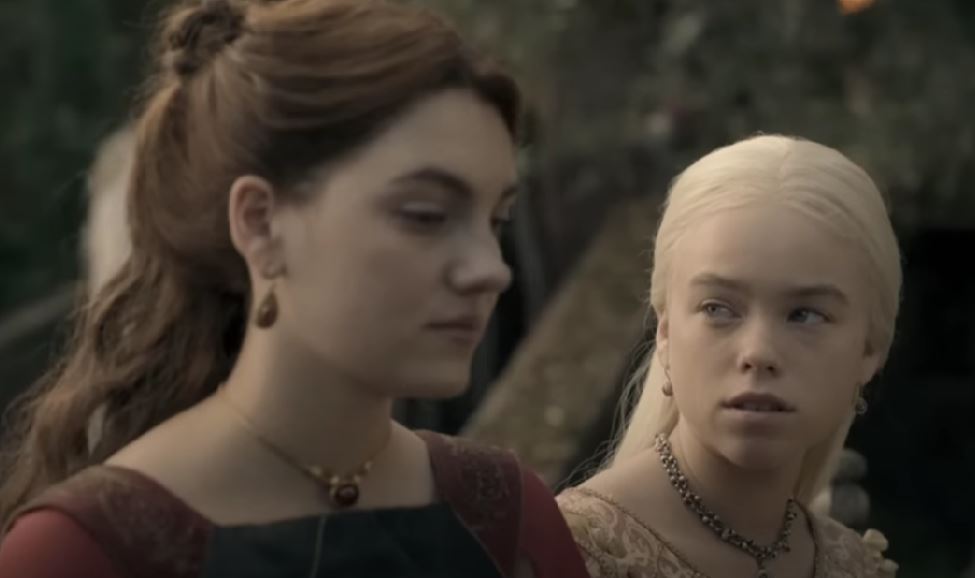House of the Dragon started far behind for me. I am not your typical Game of Thrones hater who only started noticing something was wrong in season 8 and felt a sudden betrayal by the series. I was one of those frustrated by Yara Greyjoy and her “50 best killers” running from a shirtless Ramsay in season 4. I was one of the fans seeing the warning signs when Tyrion and Jaime had a friendly goodbye that same season.
When the first four episodes of the fifth season leaked, revealing the offensive, brutally nonsensical marriage plotline of Sansa to Ramsay, along with the butchering of Dorne, I all but gave up on Game of Thrones as a satisfying adaptation.
My bitterness only grew with each season, and by the time fans and critics finally began to turn on the show with season 7’s “Beyond the Wall,” I wondered what took them so long. Season 8 was no surprising disappointment. It was the logical disaster Game of Thrones had built towards over the previous four years.

House of the Dragon had quite a bit of skepticism to overcome in my mind. I do not care that much about the Targaryens. I know their eventual fate is the near universally panned death of Daenerys Targaryen at Jon Snow’s hands. My general attitude towards anything A Song of Ice and Fire-related has taken a downturn due to Thrones and George RR Martin’s apathy towards finishing the main series.
Yet here I am, watching House of the Dragon. GRRM may not be my bitch, but apparently I am definitely his. And you know what? So far, House of the Dragon has been good enough to break through my cynicism. Is it perfect? No, but it has done wonders to rehab my fandom for this franchise.
What has been interesting about Dragon so far is the way it has both recalled the good memories of those early Thrones seasons while also making minor changes that show more faith to the material. The good of this show is also much of what made early Thrones good. These episodes have largely just involved well-drawn, compelling characters sitting in rooms talking to each other. Dragon trusts its characters and dialogue to be interesting, and for the audience to pick up on their ulterior motives and subtle maneuvers.
At the same time, it takes further steps to faithfully reproduce GRRM’s vision of Westeros. Where Game of Thrones often skimped on pageantry and pomp, House of the Dragon has tried its best to recreate it. House colors are splashed everywhere. Helmets are decorated in elaborate designs and crests. The royal hunt is a royal hunt. It is easy to immediately recognize this Westeros as the one from the books, and feel sucked into its world.
This trend also continues with the dialogue. Showrunner Ryan Condel and his writers have done an admirable job of throwing more GRRM-isms into the writing, making their characters sound more like book characters while also looking more like them.
Alone these are minor touches, but together they add up to a noticeable improvement on Game of Thrones’s first efforts to reproduce the world.
Add in a seeming improvement in the filmmaking process, with interesting direction, camera angles, cinematography, effects, etc., and House of the Dragon has been a remarkably well made story so far. There has been no real weakness in its production, with everyone and everything working together in harmony to create one of the best shows on TV all year.
The nature of Fire and Blood’s approach to covering the Dance required House of the Dragon to take liberties and make changes to create a compelling story, and even in this adaptational sense, it has seemingly knocked those changes out of the park so far. The best has been Alicent Hightower, who had her age changed to around Rhaenyra’s and their relationship changed so they were close friends before her marriage to Viserys. The one-dimensional evil stepmother has become arguably the most sympathetic character in the entire show, and perhaps the best example of what GRRM tries to portray with Westerosi marriage.
Minor spoilers, but it is the conflict between Rhaenyra and Alicent that drives the war to come, and the decision to create this deeper, richer dynamic between the two has only been good for this story.

House of the Dragon has also done a quality job of dancing around the differing accounts Fire and Blood uses to craft its history. Since the writers are trying to take three or four different versions of the story, filled with half-truths and lies, it is a challenge to pick the middle ground between them all to present as truth. The most recent episode was a great example of this. There are so many stories about what did or did not happen with Rhaenyra, Daemon, and Criston Cole. The show did their best to pick a middle ground that validates parts of every story without fully confirming any of them.
So, yeah. I like House of the Dragon. I grow increasingly optimistic with each episode. As good as it has been, though, not everything is sunshine and rainbows.
You can still see the negative Game of Thrones influence on House of the Dragon. The first episode has a gratuitously violent scene where Daemon leads his gold cloaks around stripping people and committing horrific acts on them. A tourney to celebrate Viserys’s soon-to-be born son features hilariously out of place violence where no one seems to care about their heirs bashing and killing each other. Remember the shock and anger when Gregor went after Loras in Game of Thrones? No one gave a damn when Criston Cole could have killed Daemon Targaryen, the king’s brother and heir.
The third episode features Daemon’s frustrating attempts to clear pirates from the Stepstones as a way to increase his renown and reputation throughout Westeros. His last ditch effort to win the war before Viserys gets involved sees him lay an ambush on the pirates by using himself as bait. This leads to a laughably absurd scene where Daemon fights off much of an army by himself. It fits perfectly in line with the worst excesses Game of Thrones was ever criticized of.
I get it. Game of Thrones was too popular to not emulate, for better or worse, but it is that fact that still keeps me somewhat skeptical about the direction House of the Dragon will take. It may fall victim to the same traps that Thrones did.
This is especially a worry as the story moves away from the character-rich setup happening now and moves into the violence and shock of the actual Dance of the Dragons. I wonder if the ambiguity which has served the story will only grow increasingly difficult to manage. It is largely a story that exists to make no one involved look good, and hits upon some of the same notes that made Game of Thrones so unsatisfying. The increased characterization House of the Dragon offers only increases the challenge, since these events now need to happen to people we know and care about much more than Fire and Blood’s faux historical record ever wanted you to.
The major problem with Game of Thrones was the way the story fell victim to the attention its most shocking moments produced among audiences. They never stopped striving to recreate those reaction moments, and it came at the expense of the storytelling. Will the same thing happen once the shocking moments start hitting in this show, too?
Right now, I’m optimistic. House of the Dragon has been high quality television that easily sucked me back into George RR Martin’s world. It was always a bit silly to hold Game of Thrones against House of the Dragon, since they are two different shows with different visions and showrunners. Still, how could you not? Thrones was one of the more massive disappointments in recent television history. Going back to that world, knowing the unsatisfying end of the main story, is going to be more difficult for some than others.
But here I am all the same, suggesting you should give House of the Dragon a try. It might just be worth it.
Images Courtesy of HBO
Have strong thoughts about this piece you need to share? Or maybe there’s something else on your mind you’re wanting to talk about with fellow Fandomentals? Head on over to our Community server to join in the conversation!

